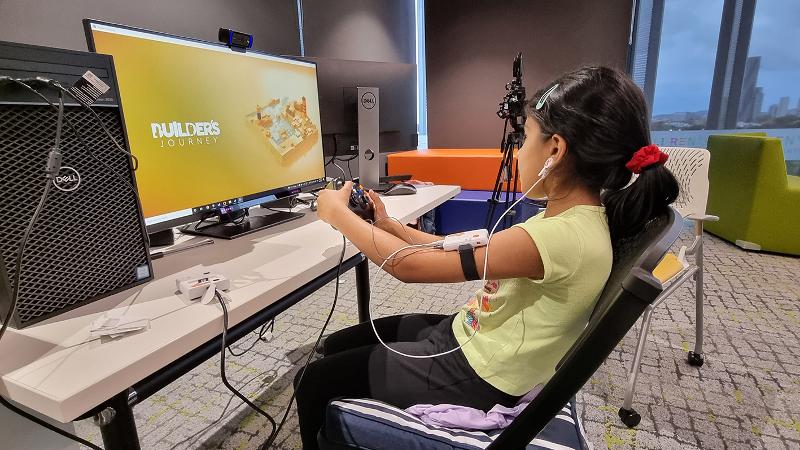
Playing video games can help boost children’s wellbeing in ways including making them feel competent, empowered and socially connected to others, according to a QUT study featured in a new UNICEF report on the impact of gaming.
The UNICEF report was released today, with the Australian component based on a QUT study led by Professor Daniel Johnson from the ARC Centre of Excellence for the Digital Child, QUT School of Computer Science and the QUT Games Research and Interaction Design Lab.
The study was unusual because of its use of tracking equipment – such as heart rate sensors and eye tracking software – to monitor the children’s real-time responses to the video games.
The researchers believe their approach is something that game designers might also be able to use to help them assess the impact of their games on child wellbeing.
Professor Johnson said the QUT study involved 68 Brisbane children aged between seven and 13. It was funded by UNICEF and the LEGO Foundation.
“Video games are a regular part of children’s daily lives and yet we don’t know enough about children’s experiences as video game players,” Professor Johnson said.
“Our study collected data from children through gameplay sessions featuring two popular titles, Rocket League and LEGO Builder’s Journey.”
Researchers collected a variety of data including heart rate, galvanic skin response, facial expressions, and eye tracking, and recorded what the children said.
This data, in turn, was analysed and matched to human emotions linked to wellbeing.

“We found clear evidence that playing the two games positively contributing to childrens’ wellbeing in terms of eliciting competence, emotional regulation, self-actualisation, empowerment, creativity, and social connection,” Professor Johnson said.
“Both games had positive impacts on their wellbeing based on the responses we tracked.
“Our study demonstrated how collecting psychosocial data during gameplay can identify a wide range of emotional and physiological states in children.
“We think there is potential for this sort of tracking data to provide even more insights than what our study looked at. For example, it might be possible to discern strategic play through eye-tracking data. We noticed the more strategic players of Rocket League appeared to be looking around the field, monitoring their opponents and their teammate, while less strategic players were primarily focused on their own avatar (car) and the ball.”

Children involved in the study were also asked to help the researchers interpret the data, becoming ‘co-researchers’ as well as gamers.
“What set this study apart was our focus on empowering children as active participants in the research process,” Professor Johnson said.
“We centred children’s perspectives on the data by asking our participants to watch recordings of themselves playing the games and review the data we collected.
“This gave our research team extra insights into the children’s experiences.
“We found that children provided insightful reflections when they helped us interpret their data. They were comfortable disagreeing with the ‘conclusions of the computer’ and providing more context for the data we collected.”
The full UNICEF report, Responsible Innovation in Technology for Children, is available online.
RELATED ARTICLE: Digital Child centre and UNICEF Australia champion young children’s digital wellbeing
QUT Media contacts:
- Mechelle McMahon, media@qut.edu.au
- After hours, 0407 585 901 or media@qut.edu.au


